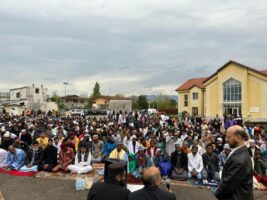Lowell Bennion tells a challenging story.
Near the center of the Salt Lake Valley at the end of a picturesque lane lives a little lady of seventy-five in a two-room shack. Her house is heated by a coal range, which has a broken grate and a big hole between the firebox and the oven that prevent her from baking. The pipe from the stove to the chimney has a large crack that releases smoke and soot into her kitchen. She heats water for dishes and a sponge bath on top of the stove. Since the drainage system doesn’t work, she throws her waste water out the front door. Years ago, a leaky roof rotted away the bedroom ceiling and caved it in, so she now sleeps on the living room couch and looks up at another ceiling that is bowed toward her. The kitchen floor is covered with pieces of linoleum to cover up the cracks.
Her Social Security income is about $173 per month, so she can’t fix up the house herself. Her husband died nineteen years ago, her only son eight years later. She has two daughters—one divorced with four children, the other chronically ill with six children and a husband of modest means.
Less than a block away stands an LDS chapel where the faithful meet regularly to praise God, to take upon them the names of Jesus Christ, and to discuss the Lord’s poor in priesthood [and Relief Society]. A few miles to the east other Saints live in luxurious homes with many bedrooms and multiple bathrooms.
While Lowell Bennion told this story in 1978, I testify that the poor are still with us. I further testify that the organization of our society tends to insulate us from some of the unrelenting need all around us. But it is still there.
When Nancy and I lived in Alabama and Arkansas, we were not so insulated from the painful reality. The dear woman who was raising her grandchildren who had no food for them—we wept for her. The earnest brother whose house was not safe but who did not have the wherewithal to repair it. The single mom whose van kept breaking down. Constantly we felt the invitation. We were glad to be aware of the need even if we were often overwhelmed by it.
Of course, our experience in the American South is nothing compared to the endless and unrelenting need in Turkey, Syria, Ukraine and unnumbered places around the world. It seems that God has provided a vast opportunity to use our resources as evidence of our discipleship.
King Benjamin teaches us that God has transferred our debts to Him to His struggling children.
And now, for the sake of these things which I have spoken unto you—that is, for the sake of retaining a remission of your sins from day to day, that ye may walk guiltless before God—I would that ye should impart of your substance to the poor, every man according to that which he hath, such as feeding the hungry, clothing the naked, visiting the sick and administering to their relief, both spiritually and temporally, according to their wants. (Mosiah 4:26)
If we want to retain a remission of our sins, God directs us to care for the poor. The Lord asks us to partner with Him in taking care of His beloved other sheep—the financially poor who struggle to have the basic needs of life, those in need of refuge, and the poor of spirit who struggle with a lack of hope or light. He invites us to become more like Christ—more caring, more generous, more desirous of helping to bear the burdens of others.
Right now—today—my exemplary wife is organizing our affluent ward to gather blankets for disaster victims. Over the last few years, Nancy has spent hundreds of hours helping refugees in our community—helping them navigate this foreign culture and create opportunities for their families. When we lived in the south, we felt blessed to have the opportunity to help a struggling community member repair his crumbling home and we continue to be blessed with opportunities to help serve neighbors and ward members with various needs.
There are many ways we can “impart our substance to the poor.” We can budget some of our gains for regular donations to the Church’s humanitarian fund or other worthy charities. We can contribute to the local food bank. Even if we don’t have the financial ability to give much, we can help in other ways. For example, we can comfort those who are mourning, struggling, or depressed. We can offer to tend a neighbor’s children. We can ensure we are attuned to the needs of those we are asked to minister to—both their temporal and their spiritual needs. We can reach out to those who are aging and lonely. “There are chances for work all around just now, Opportunities right in our way. Do not let them pass by, saying, ‘Sometime I’ll try,’ But go and do something today” (Have I Done Any Good? Hymn 223).
May we, each and every one of us, ask God how we can help take care of His struggling children. May we look around us and seeing the need, act to help.
Invitation: Would you like to learn the eternal principles that make strong marriages? Join us in our next marriage retreat on March 18 in Alpine, Utah. To register, go to: https://drwally.com/event/create-a-heavenly-marriage-using-eternal-principles/
Thanks to Barbara Keil for her helpful editorial suggestions.


















